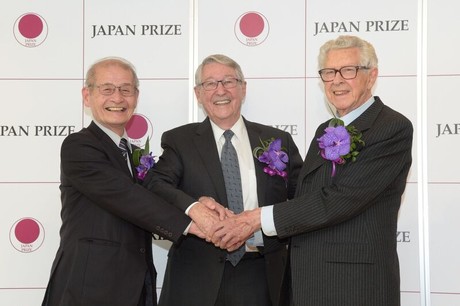Australian researcher wins prestigious award

Veteran Australian immunologist Jacques Miller and American professor Max D Cooper have been awarded the 2018 Japan Prize for discovering the dual nature of adaptive immunity, fuelling rapid advances in medical science.
Dr Miller, Emeritus Professor at The Walter and Eliza Hall Institute of Medical Research in Melbourne, Australia, and Dr Cooper, Professor in the Department of Pathology and Laboratory Medicine at Emory University School of Medicine in Atlanta, Georgia, were honoured for deciphering the T and B lymphocyte lineages that are responsible for protecting our bodies from infection. The discovery has served as the driving force behind advances in immunotherapies and also aided in the foundations of T cell biology research, the findings of which are being used to create treatments for blood cancers such as leukaemia and lymphoma.
Dr Miller demonstrated that the thymus, an organ then considered to be vestigial, is vital for the development and function of the adaptive immune system. He also demonstrated that mouse lymphocytes can be separated into two developmentally and functionally distinct lineages that were later called T and B lymphocytes, and that in mammals, T lymphocytes are produced by the thymus.
Meanwhile, Dr Cooper, as a pediatrician, noticed apparent differences in the clinical manifestations among patients suffering from primary immunodeficiencies, leading him to hypothesise the existence of functionally different cell lineages in the adaptive immune system. To verify this hypothesis, he used chickens without bursa of Fabricius or thymus and found that B (bursa-derived) lymphocytes are required for antibody responses of humoral immunity, while T (thymus-derived) lymphocytes are responsible for delayed-type hypersensitivity responses, graft-versus-host reaction and skin-graft rejection, all of which are mediated by cellular immunity.
The series of studies by Dr Miller and Dr Cooper thus revealed the dual nature of the adaptive immunity, the B lymphocyte-mediated humoral immunity and T lymphocyte-mediated cellular immunity.
“I am very privileged to have been selected as a laureate of the Japan Prize. It has been my life’s work to understand how the body responds to infection and cancer and I am pleased to have been recognised for the contribution that the work of Dr Cooper and I has made. It is my hope that our work will provide further opportunities to improve human health,” said Dr Miller on receiving the award.
Their discoveries fuelled rapid advancements in both basic and applied sciences, creating ripple effects socially and economically. In recent years, the developments of new anticancer drugs (such as immune checkpoint inhibiting antibodies and genetically modified T lymphocytes) and anti-cytokine antibodies for the treatment of autoimmune diseases, such as rheumatoid arthritis and inflammatory bowel disease, have received great attention in the field of Medical Science and Medicinal Science. These recent accomplishments would not have been possible without the ceaseless efforts in basic immunology and translational research that unfolded in the wake of the pioneering discoveries made by Drs Cooper and Miller.
Along with Dr Miller and Dr Cooper’s award, Dr Akira Yoshino will be awarded the Japan Prize in the Resources, Energy, Environment and Social Infrastructure field for his development of lithium-ion batteries. This battery type is used regularly to power smartphones and laptops. It is also being used in electric vehicles to reduce emissions of environment-impacting substances.
Yoshio Yazaki, president of The Japan Prize Foundation, believes that the winners have significantly benefited the world with their discovery. “Dr Miller and Dr Cooper have been chosen to be awarded this prize for the momentous part they have played in improving the world we live in. Science and technology have the power to change our lives and the Japan Prize Foundation wants to acknowledge those people who have made a difference to the peace and prosperity of all mankind,” he said.
The Japan Prize is awarded to scientists and researchers, regardless of nationality, who have made significant contributions to the progress of science and technology, as well as society, to further the peace and prosperity of mankind. While the Prize encompasses all fields of science, two fields are designated for the Japan Prize each year. The Prize is highly competitive with over 13,000 nominators strictly comprising prominent scientists and researchers from across the globe.
Vaxxas appoints former Merck Global Vaccines President David Peacock as CEO
To lead the commercialisation of Vaxxas's proprietary high‑density microarray patch (HD‑MAP)...
Optics11 Life appoints Jacquelien ten Dam as CEO
Optics11 Life plans to accelerate its commercial growth in key markets while building strategic...
Epilepsy pioneer elected President of Aust Academy of Science
Laureate Professor Sam Berkovic — one of the world's most respected neurologists...



